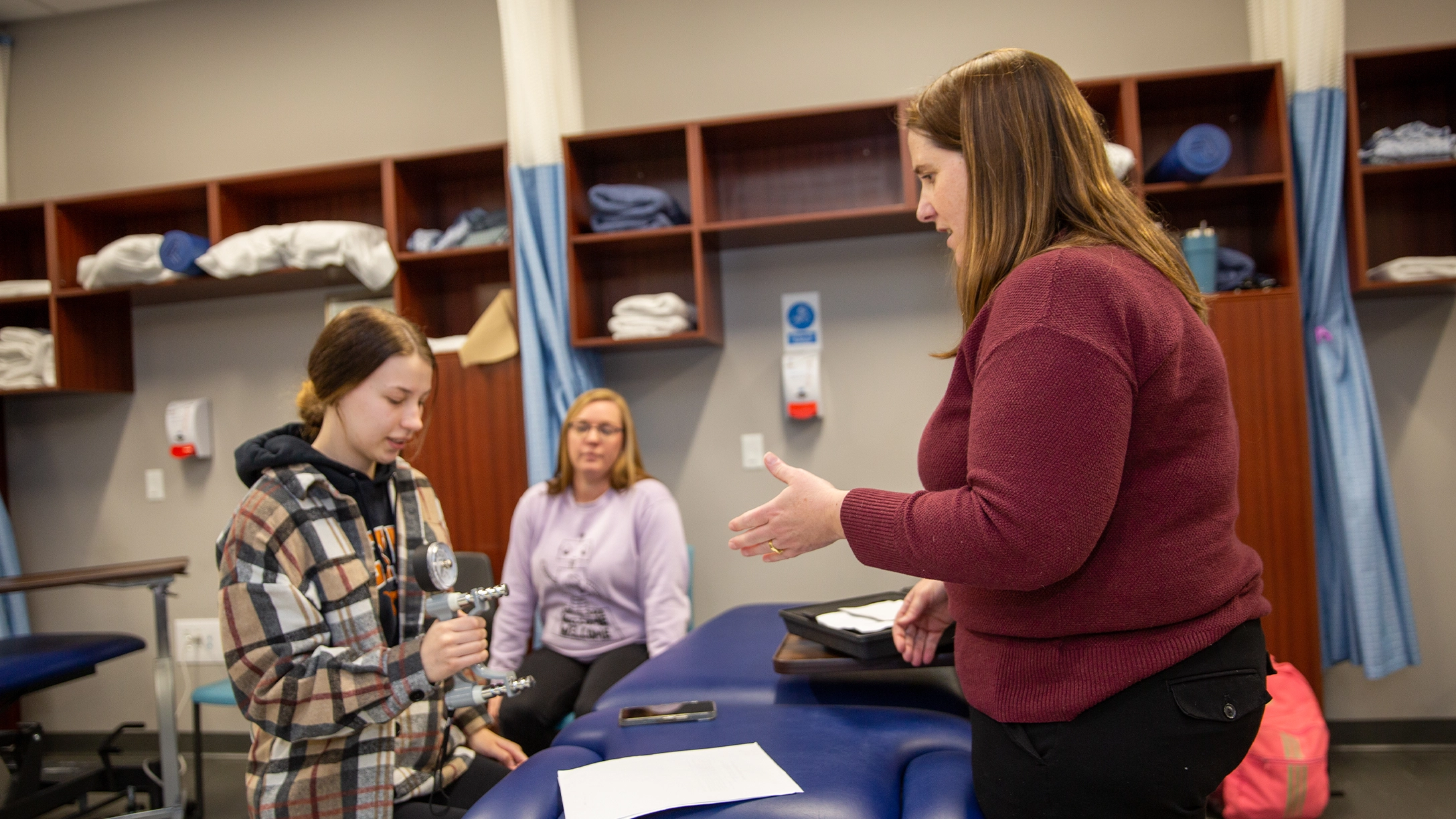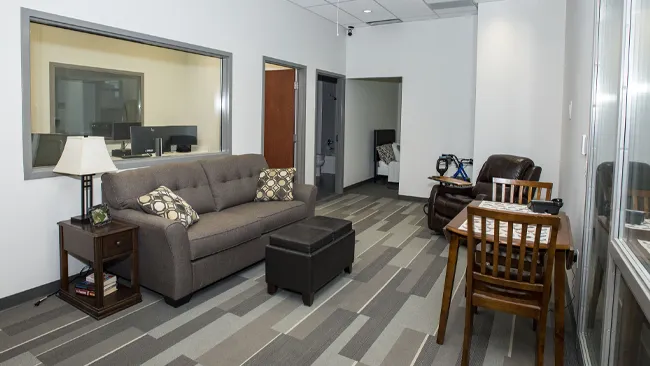
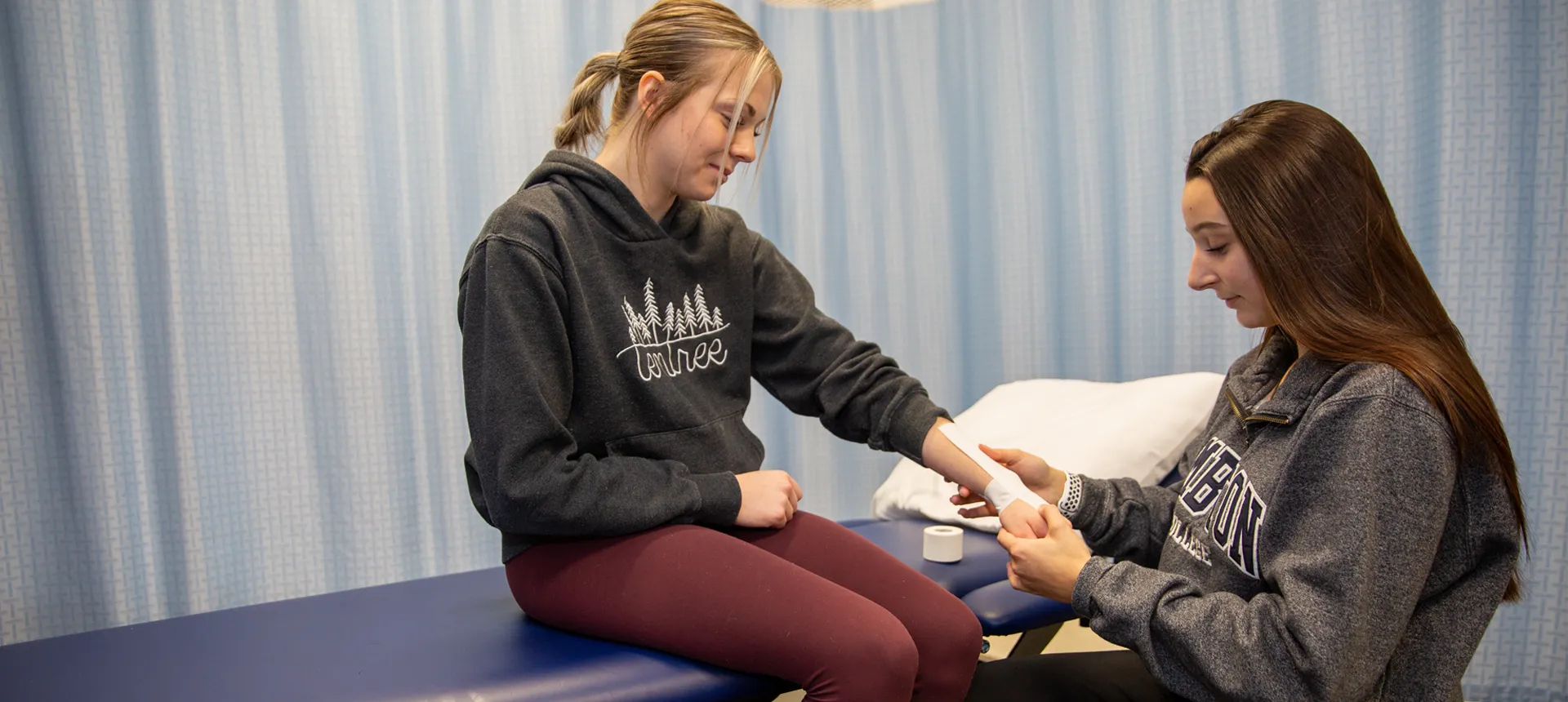
Occupational Therapist Assistant & Physiotherapist Assistant
CIP Code: 51.0817
Overview
Are you an empathetic individual who is interested in the overall health and wellness of others? Explore a career as an Occupational Therapy or Physiotherapist Assistant - the need has never been greater.
With ever-increasing numbers of aging people requiring assistance to continue a full life and with changes to the way health care services are delivered, the need has never been greater for Occupational Therapist Assistants and Physiotherapist Assistants.
The Lambton College Occupational Therapist & Physiotherapist Assistant, Ontario College Diploma program will train students to support and enable individuals of all ages whose ability to function in their daily activities has been impaired due to illness, injury, surgery, or chronic health conditions. Students learn how to assist in implementing treatment plans that promote a client's independence in activities that are meaningful and important to them.
The unique program curriculum will engage students throughout the four terms, as students learn how to assist clients to achieve their health goals and improve their quality of life. The faculty members in the program are experienced occupational therapists, physiotherapists, and assistants who work in a variety of health care settings. Faculty will ensure that students are well equipped with theoretical knowledge, training, and hands-on experience to become successful health care professionals. The integration of in-class studies with hands-on experience is accomplished through rich experiential lab opportunities and practice in a variety of clinical fieldwork placement settings.
Sarnia - A Great Place to Study
Immerse yourself in Canadian culture in Sarnia's small community that cares.
Enjoy the beautiful city on the shores of Lake Huron, live affordably, and let us help you succeed in your future aspirations.
Admission Requirements
O.S.S.D. or equivalent with:
- Grade 12 English C or U
- Grade 11 or 12 Biology C or U
-or-
Grade 11 or 12 Chemistry C or U
(both recommended, only one required)
The admissions process is competitive and meeting the minimum academic requirements does not guarantee admission.
Lambton College reserves the right to alter information including admission requirements and to cancel a program or course at any time; to change the program curriculum as necessary to meet current competencies or changes in the job market; to change the pathways to third-party certification bodies; or to withdraw an offer of admission both prior to and after its acceptance by an applicant or student because of insufficient applications or registrations or over-acceptance of offers of admission. In the event Lambton College exercises such a right, Lambton College's sole liability will be the return of monies paid by the applicant or student to Lambton College.English Language Requirements
Applicants must submit proof of English proficiency through one of the following in-person test methods:
- IELTS Academic: Overall score of 6.0
- TOEFL IBT: Overall score of 70
- PTE Academic: Overall score of 53
- CAEL: Overall score of 60
- CELPIP: CLB 7
- Lambton Institute of English Placement Test: Overall score of 70
- Completion of an English pathway program at a recognized partner school
Meeting the minimum English requirements does not guarantee admission. Students with higher English proficiency scores will receive priority in the admission assessment process. Not all students will qualify for EAP-3106 in place of the required IELTS or TOEFL test scores.
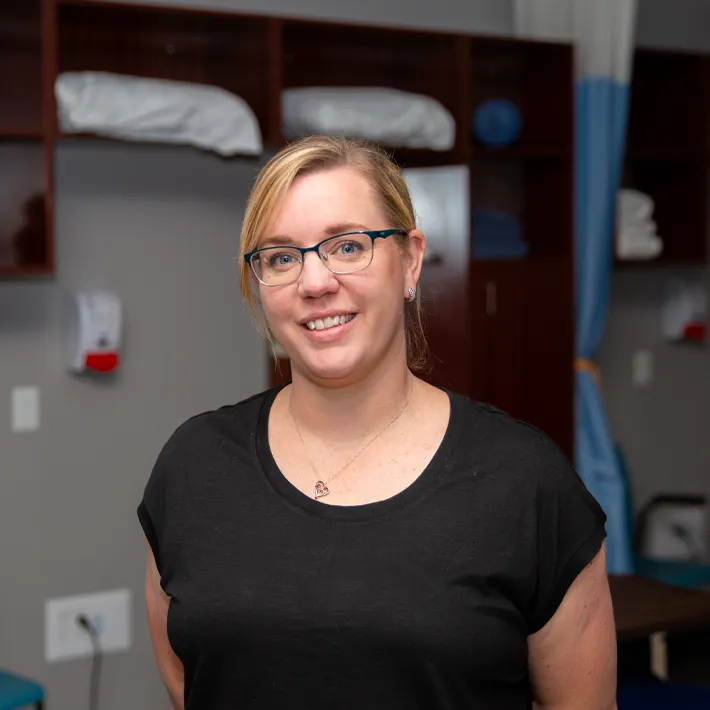
Wendy Posadas - Mom of two and OPTA student
Wendy's Story
"After years of having a career in a creative field, I felt a desire to move into something health care related. While researching options and opportunities, I had some family experience with various therapies through local services and the OPTA career path really caught my attention. I was excited about the possibilities that came with working in this field.
I love that all of the teachers have actual field experience. Their field knowledge has helped me gain further understanding of the role of an occupational therapy assistant and the many career opportunities that are available."
Costs
- Term 1 $7,743.38
- Term 2 $6,953.35
- Term 3 $7,653.35
- Term 4 $6,953.35
Total Cost of Program
Tuition fees are estimates and are subject to change each academic year. Fees do not include books (unless specifically noted), supplies or living costs.
Lambton College reserves the right to alter information including admission requirements and to cancel at any time a program or course; to change the location and/or term in which a program or course is offered; to change the program curriculum as necessary to meet current competencies or changes in the job market; to change the pathways third-party certification bodies; or to withdraw an offer of admission both prior to and after its acceptance by an applicant or student because of insufficient applications or registrations or over-acceptance of offers of admission. In the event Lambton College exercises such a right, Lambton College’s sole liability will be the return of monies paid by the applicant or student to Lambton College.
Additional Fees
-
Textbooks (per year)$1,000.00
-
Passport to Placement$40.00
-
Name Tag$15.00
-
Police Records Check$40.00
Travel Expenses
Students are responsible for all costs associated with traveling to clinical placements.
Important Dates, Deadline & Late Fees
For additional information on registration dates, deadlines and late fees please refer to Registration Dates and Deadlines.
Student Fees
A student services fee is included in your tuition.
Health Insurance Coverage
Emergency medical insurance is mandatory for all international students at Lambton College. This includes students who are full-time and part-time and who are on a co-op. This insurance is provided by GuardMe - a third party insurance provider.
See Insurance Costs & DetailsTechnology Requirements
In order to keep pace with the requirements of each and every course in your program, Lambton College requires that each student have access to a laptop while studying at our college.
Labs & Equipment
Courses
Human Anatomy & Physiology I
This course is the first of two courses that provide a basic introduction to the structure and function of the human body. The micro and macro anatomy of selected organ system are examined, and the interrelation of physiology is discussed. The constituents of the body are introduced with focus on foundational concepts such as movement, support, and transportation. Course content is designed with OTA/PTA applications and acts as a framework for understanding rehabilitation of the human body.
Human Movement & Functions
This course introduces learners to concepts of normal human movement within a three dimensional context. Students learn how to describe the body in motion as it relates to function and mobility. Students also explore concepts of posture including its dynamic transitions through activity. An introduction to basic patient handling and proper body mechanics for the Occupational Therapist Assistant (OTA) and Physiotherapist Assistant (PTA) is reinforced.
Introduction to Rehabilitation
This course introduces the definition and broad concept of rehabilitation including the various forms of its delivery. The specific fields of Occupational Therapy and Physical Therapy are explored with a focus on principles of theory and models of practice. A foundational understanding of professional practice begins to be formulated through an examination of the role and scope of practice for the OTA/PTA, professional organizations, and governing legislation.
Clinical Conditions in Rehabilitation
This course outlines commonly encountered diagnoses and medical conditions where rehabilitation services are often indicated. A general overview of conditions, their causes and basic medical management are discussed. Emphasis however, is focused on how occupational and physical therapy approaches are used to facilitate recovery.
Critical Thinking & Writing
In this writing course, students respond to current issues and news articles via various styles of paragraphs and essays. Students practice thinking critically and organize and hone their writing to ensure clarity and correctness in their messages. Students explore different perspectives, and through synthesis, analysis, and response, strive for clarity of message and diplomatic expression of opinion based on fact. One of the pillars of Lambton College is a commitment to sustainability and equity, diversity, and inclusion, including Indigenization of the curriculum; where appropriate, readings in this course will reflect this commitment. Critical Thinking and Writing lays the foundation for a subsequent research-writing course.
Human Growth & Development
Using a developmental psychology lens this course focuses on providing students with an opportunity to improve understanding of development and self in the context of global community. Students will examine the human lifespan from infancy to old age, across physical, cognitive, social and personality contexts. Foundational theories, socio-cultural and historical context, as well as an examination of current issues within Canada, provide the learner with opportunities for critical thinking and a better understanding of the influences on their own development and self-awareness. Applied learning assignments provide learners with the opportunity to demonstrate learning while also adding to their co-curricular record. Global partnership, diversity and equity, epigenetic change, and transgenerational impact are recurring themes throughout.
General Education Elective
Human Anatomy & Physiology II
This course is the second of two courses that provide a basic introduction to the structure and function of the human body. The constituents of the body are introduced with focus on foundational concepts such as communication, control, integration, and reproduction. Students will continue to develop their musculoskeletal knowledge base while expanding into interrelated body systems. Course content is designed with OTA/PTA applications and acts as a framework for understanding rehabilitation of the human body.
OTA Skills - Occupation
This course highlights OT treatment as it applies to the three occupational domains of self-care, productivity and leisure. Techniques within the scope of the OTA role are thoroughly examined including core concepts of activity selection, activity analysis, grading and compensation / adaptation. Consideration of clients across age and diagnostic spectrums are achieved. Through course assignments and structured labs, students develop clinical skill-sets in preparation for Fieldwork Experience.
Communications for Health Sciences
This course, designed for students in the health field, further develops students' communication proficiency. Students create workplace documents and research reports and share their findings through oral presentations. Advocacy and peer education will drive the research and documentation process. Current health issues and research will serve as the impetus for creation of informed research reports and presentations.
Psychology
This course focuses on how we behave. It is an attempt to understand ourselves and others. The primary goal of this course is to see psychology as an objective way of studying human experience.
OTA/PTA Skills - Foundations of Therapeutic Exercise
Therapeutic exercise will be a large focus for this course. Students will begin to develop an understanding of the body's response to therapeutic exercise. Students will develop an appreciation for how strength, range of motion and stretch are key components to an effective treatment plan. Principles of indication and exercise prescription, as well as contraindications will be addressed. Lab session will allow the student to develop and practice handling techniques that promote safe and effective patient outcomes.
General Education Elective (Select 2)
Field Experience Prep
This course addresses topics to prepare students for practical Fieldwork Experience. Clinical documentation and communication are studied with an emphasis on accuracy, relevancy and priority. An introduction to Subjective, Objective, Assessment, Plan (SOAP) and Data Action, Response, Plan (DARP) formats are covered. Basic principles and practices of Infection Control as it applies to rehabilitative settings are discussed. An introduction to Workload Measurement is also provided. Emerging personal professionalism is studied with the creation of a Learning Portfolio at the conclusion of the course. This tool is used during work-site placements to guide personal development and promote self-reflection.
OTA/PTA Skills - Transfers, Gait & Mobility
This course explores the principles and techniques applied to facilitate a client's ability to transfer, ambulate and mobilize to their full potential. Concepts of balance retraining are covered. The student will be encouraged to develop an appreciation for how movement retraining, combining functional and repetitive practice, results in best client outcomes. The use of gait aids, orthoses, bracing, and other assistive aids will be highlighted.
OTA/PTA Clinical Skills - Electrophysical Modalities & Cardiopulmonary Rehabilitiation
This course explores additional therapeutic techniques available to the OTA/PTA. Electrophysical agents and hydrotherapy are introduced. Foundations of cardiopulmonary rehabilitation including aerobic exercise training and respiratory/breathing exercise are also studied. Finally, strategies for effective exercise instruction and client coaching are explored.
OTA Clinical Skills - Person & the Environment
This course highlights Occupational Therapy treatment as it applies at the level of the person and the environment. Techniques within the scope of the OTA role is thoroughly examined including concepts of seating, upper extremity function and positioning, environmental adaptation and advocacy. Consideration of clients across age and diagnostic spectrums is achieved. Through course assignments and structured labs students enhance their clinical skill-sets in preparation for Fieldwork Experience.
Enhanced Therapeutic Skills
This course examines tailored and effective approaches that can be used by an OTA/PTA to enhance therapeutic encounters with clients. Specific focus is on conditions of impairment related to communication, cognition, perception and mental health. Laboratory work promotes an experiential component along with formal skills acquisition. Concepts of therapeutic use of self and group treatment are addressed.
Field Experience I
Skills within the assistant role are practiced and progressed from a basic-level to an intermediary-level of competency. Students use their personal learning portfolios to track and enhance the learning experience.
Clinical Case Studies - Consolidation
This course follows a group-based format that allow students to engage in solution-focused learning. Course content chronicles select patients whose rehabilitative profiles reflect diversity in diagnosis, personal attributes and complexity of care. Within their role as an OTA/PTA, students integrate cumulative course material as they document the therapeutic process, implement and modify treatment plans, anticipate barriers to progress and generate solutions that promote therapeutic success and satisfaction. Elements of safety, interdisciplinary collaboration, advocacy and professional ethics will be woven into the learning process to promote enhanced consolidation.
Rehabilitation - Broader Perspectives & Current Trends
This course explores rehabilitation from both a national and international perspective. Rehabilitation as a component of the Canadian Health Care System is compared to that of its place on the global stage. Students become familiar with the World Health Organization and the International Classification of Functioning, Disability and Health. Current trends in research (including roots of international origin) are discussed. Topics of classroom discussion and assignment foster an appreciation for how rehabilitation services are influenced by research, resources, and both geographic and cultural diversity.
Professional Practice
This course explores select components of professional practice: non-clinical supportive roles, worksite logistics, personal presentation and time management. In addition, students have the opportunity to become broadly familiar with resume and interview trends in the healthcare field, creative job search strategies and resources that can support an OTA/PTA that is employment-ready.
Field Experience II
During the field experience, skills within the assistant role are practiced and progressed from an intermediatory-level of a competency to a level where the student will be fully competent to enter practice.
Contact
Centre for Global Engagement
LAMBTON COLLEGE SARNIA
1457 London Road
Sarnia ON N7S 6K4
After Graduation
Employment Opportunities
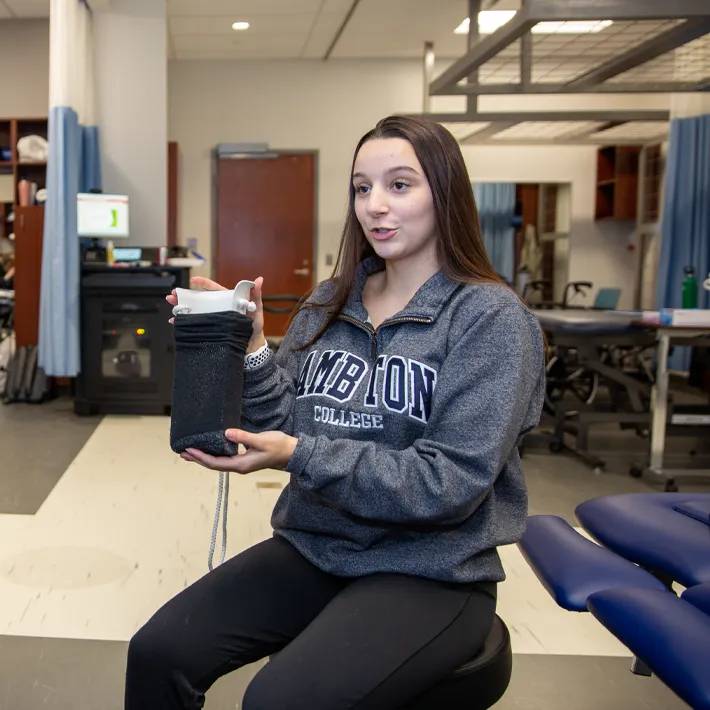
Upon graduation, students are prepared to work as an occupational therapist and physiotherapist assistant under the supervision of a registered occupational therapist or physiotherapist. Employment opportunities with competiive salaries are readily available in a variety of settings such as, hospitals, long term care homes, community agencies, private clinics, schools, and children's treatment centres.
Accreditations & Certifications
Certificates & Training
Students in this program will obtain the following certifications as part of the program curriculum:
- Gentle Persuasive Approach
- Non-Violent Crisis Intervention Training
Pathways
Transfer to Programs within Ontario
Lambton’s Occupational Therapist Assistant graduates are now eligible to enter directly into the third year of Sheridan’s Bachelor of Health Science in Kinesiology and Health Promotion.
To qualify, graduates must complete an asynchronous bridge term from May to August, which includes:
- May-June: Ergonomics, Exercise Physiology
- July-August: Nutrition, Introduction to Health Promotion, plus one elective
A minimum grade of 60% is required in these courses to progress into the third year of the degree program.
For more information, contact pathways@sheridancollege.ca
Want to see more Ontario transfers? Visit ONTransfer.ca.
Looking for Support After Graduation?
The International Graduate Services & Support Centre (GSSC) is a place dedicated to assisting International alumni as they seek employment and settle into Canadian life following graduation.
Immigration Regulations & Changes
Immigration regulations are legislated by the Federal Government of Canada and are subject to change at any time without notice. Students are responsible for ensuring that they are in compliance with all Immigration, Refugees and Citizenship Canada regulations at all times during their studies and while in Canada. Lambton College staff are not authorized to provide advice or guidance on immigration-related matters. Prospective applicants and current students should consult the Immigration, Refugees and Citizenship Canada website or call the IRCC Call Centre at 1-888-242-2100 to answer or clarify any immigration-related questions or information.
Placement
Placement Schedule
Students will have the opportunity to acquire hands-on experience in unpaid placements in the second year of the program. There will be two, seven-week long placements where students will obtain over 500 hours of Occupational Therapy Assistant and Physiotherapist Assistant experience. Placement sites include hospitals, clinics, home care, long term care homes, schools, and children's treatment centres.
More Information
Student Responsibilities
- Course and program delivery schedules are proposed and subject to change for each intake.
- Students are required to bring their own laptop with wireless capability.
- Students are advised to bring an official copy of their most recent police clearance, driver's license, and vaccination record from their home country.
Post-Graduate Employment
International students who successfully complete their programs of study at Lambton College may be eligible to apply for a Post-Graduation Work Permit (PGWP) Program. This program allows students to gain valuable Canadian work experience.
A work permit under the PGWP may be issued for the length of the study program, up to a maximum of three years. A post-graduation work permit cannot be valid for longer than the student's study program, and the study program must be a minimum of eight months in length. The length and approval of the PGWP is determined solely by Immigration, Refugees and Citizenship Canada (IRCC).
Students must meet the eligibility requirements to apply for a post-graduation work permit.
Immigration Regulations & Changes
Immigration regulations are legislated by the Federal Government of Canada and are subject to change at any time without notice. Students are responsible for ensuring that they are in compliance with all Immigration, Refugees and Citizenship Canada regulations at all times during their studies and while in Canada. Lambton College staff are not authorized to provide advice or guidance on immigration-related matters. Prospective applicants and current students should consult the Immigration, Refugees and Citizenship Canada website or call the IRCC Call Centre at 1-888-242-2100 to answer or clarify any immigration-related questions or information.
Technology Requirements
It is recommended that students purchase a laptop with a Windows operating system.
Internet Speed Requirements
For best performance for students learning remotely, an internet connection with a minimum of 40 Mbps download and 10 Mbps upload speed is recommended in order to effectively use video conferencing and remote lecture delivery software as well as, other online resources remotely. Due to the large area over which students may be dispersed, we are unable to recommend a specific provider, so you will need to inquire around your area to find one that best suits your needs.
Minimum Laptop Requirements
In order to access the internet and virtually-delivered software and courseware, student laptops should include the following at a minimum. By meeting the following specifications, students will be equipped to access software and courseware on their laptop through the internet:
- Intel i5 8th Gen Processor or equivalent
- 16 GB of RAM (with a minimum of 8 GB)
- 100 GB HDD or more
- HD Graphics
- Webcam with a microphone
- Wireless 802.11n/ac 5ghz capable
- Windows Operating System (Windows 11)
Please note that Chromebooks and MacBooks may not support all software required for your program; students should verify compatibility with their professors.
Software
To ensure students are getting the most our of their classroom experience, some software will be required.
Lambton College has made this software easily accessible online. Students can leverage our Microsoft Office 365 software packages and services. In addition, much of the software you require for your courses will be available on demand for use on any device - on or off campus.
